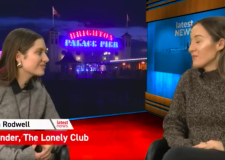Film: Jessica Kellgren-Hayes
New wave beginnings
This year’s Brighton Festival will be celebrating French filmmaking legend Agnes Varda with a gallery installation, a short selection of her films, plus a personal appearance. Varda was the only female director of the French New Wave- a blanket term coined by critics for a group of French filmmakers in the late 1950s and 60s. Her films are lauded for their feminism due to their use of female protagonists and celebration of the female cinematic voice. Many of her films use protagonists that are marginalised or rejected members of society. Recently she was awarded a Lifetime Achievement Award by the European Film Academy for her outstanding body of work.

Now 86, Varda’s film career predated the New Wave and in many ways inspired it. Never a formally organised movement, the New Wave filmmakers were instead linked by a youthful iconoclasm, experimentation with the film form, a desire to shoot contemporary social issues on location and by their conscious rejection of popular literary period pieces written at the time. Varda’s self-funded debut, the hybrid fiction-documentary hybrid, 1956’s La Pointe Courte is often considered the unofficial first New Wave film. When she made it (and this is an important part of the New Wave style), she had no professional cinema training- her early work included painting, sculpting and photojournalism.
The style of cinema Varda was engaged in made the point that a filmmaker should begin with a tale based in realism and then use film equipment to bring that story to others, rather than trained film professionals creating their own truth from fiction. The combination of subjective realism and authorial commentary created a narrative ambiguity as questions arise from the films that are not generally answered in the end- much like life itself!
Auteur theory, the concept that a film reflects the director’s personal creative vision, clearly influenced Varda who created her own signature style by using the camera “as a pen.” Rather than separating the fundamental roles that contribute to the making of a film (director, cinematographer, screenwriter, etc…) Varda believes that all roles should work together simultaneously to create a more cohesive film and that all elements should contribute to its message.
Due to Varda’s photographic background, still images often serve symbolic or narrative purposes and she claims to make most of her discoveries whilst editing, much like photographers who worked before digital were never sure exactly what they had captured before developing the film. These ‘found’ images then create a motif.
Over many decades Varda has become a force in art cinema, conceiving many of her films as political and feminist statements. Check the listings for where to find Varda’s events in the Festival and make sure to visit the installation in the University of Brighton Gallery on any day between Saturday 2nd and Sunday 24th of May.
Check our Facebook page, ‘FilmFest on TV’ for more details or email me directly via Jessica@thelatest.tv





















